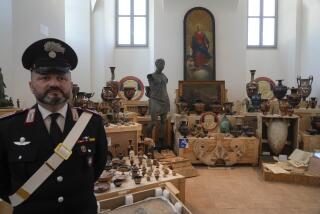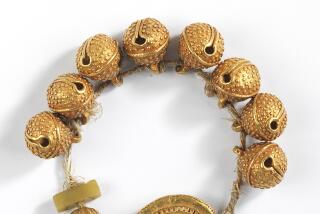Looters Target Iraq’s Antiquities : Archeology: The ‘cradle of civilization’ has been left unprotected amid nation’s economic ills. Illegal digs are commonplace since the Gulf War. Lack of funds has nearly closed the museums and stripped security at sites.
- Share via
BAGHDAD — When word reached Baghdad that another archeological site was being looted, the Antiquities Department rushed an armed team to halt the illegal dig in the southern city of Amara.
It took a fierce gun battle to drive away dozens of nomads who had gouged huge craters and carted off hundreds of cuneiform tablets more than 4,000 years old.
Muayad Damerji, head of the government’s Antiquities and Heritage Department, lamented that the thieves probably damaged many tablets by hacking out holes with shovels and other tools.
“These people were peasants who had no idea what they were doing,” he said. “They might as well have been digging for rocks.”
Iraq’s economic crisis has left the Antiquities Department desperately short of cash. That has meant a near shutdown of the museum system and the extensive archeological work that was being carried out in ancient Mesopotamia, the “cradle of civilization.”
Iraq lists 4,000 pieces that were stolen from its museums in the aftermath of the 1991 Gulf War, including jewelry, pottery, coins, cylinder seals and terra cotta figures. The number of items taken from archeological sites probably numbers in the thousands as well, officials say.
Only one item has been recovered--a cuneiform tablet confiscated from a London art dealer and returned by British authorities in 1992.
Damerji receives regular reports of clandestine digs in a country that has 10,000 archeological sites and only a handful of poorly paid guards to protect them.
“The history of Iraq is the history of the ancient world,” said Damerji. “And this treasure is being badly damaged.”
In southern Iraq, it is mostly peasants who either stumble upon sites or are offered money by foreign smugglers to dig up known sites, Damerji said.
In northern Iraq, there are tales of highly organized digs by people with European features around the towns of Irbil and Sulaimaniya, areas now controlled by ethnic Kurds.
The relics are smuggled out to Jordan or Iran and eventually make their way to Europe, most often to London, said Damerji, who has run the Antiquities Department for 18 years.
Economic sanctions imposed by the United Nations after Iraq invaded Kuwait “make it difficult to buy our daily bread, and this has encouraged people to steal our national treasures,” Damerji said.
The illegal dig in Amara, which took place in February, is one of the few cases to end with authorities retaining some of the treasures.
After the intruders were driven off, officials counted 240 freshly dug holes, some 12 feet deep and 15 feet wide. Many tablets undoubtedly were taken away, but authorities recovered 470 others--enough to fill one of the larger rooms at the Iraq Museum in Baghdad.
During a reporter’s recent visit, four women at the museum were poring over the dun-colored tablets, some the size of a book, others as small as the palm of the hand.
The women painstakingly brushed away dirt from the tiny, precise grooves that were carved into the soft mud. They then recorded the symbols by hand on notebook paper.
These tablets are not riveting reading. Recording agricultural production figures, they are essentially a 4,000-year-old Farmer’s Almanac.
Aside from occasional exhibits, the museum has been closed to visitors since the Gulf War. Its magnificent collection, with relics from the earliest human settlements more than 6,000 years ago, are locked away in storerooms.
Before the war, at least a dozen teams of Western archeologists visited Iraq each year. That all stopped due to the comprehensive embargo placed on Iraq by the United Nations.
Damerji’s budget has been wiped out by runaway inflation. He had 75 vehicles to patrol archeological sites before the war. Today only six are in service due to a lack of money and spare parts, he said.
American pressure has prevented international contacts with Iraq by such groups as the U.N. Educational, Scientific and Cultural Organization, based in Paris, he said.
“It’s UNESCO’s job to send inspectors and help us track down these missing items. They have done nothing,” Damerji said.
But Iraq’s own record in handling cultural treasures has been badly tarnished in recent years.
After Iraq’s 1990 invasion of Kuwait, Iraqi officials went to Kuwait’s national museum and packed up the spectacular Islamic art collection, which was then sent to Baghdad.
Some priceless items, such as intricately carved wooden doors from a 10th-Century mosque, were too bulky to be removed. So Iraqi soldiers torched the entire museum shortly before they were driven out of Kuwait. The huge doors and several other unique pieces were reduced to ashes.
More to Read
Sign up for Essential California
The most important California stories and recommendations in your inbox every morning.
You may occasionally receive promotional content from the Los Angeles Times.










